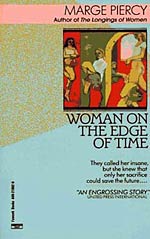
![]() Grayman14
Grayman14
4/20/2016
![]()
"She was sitting against the wall on the porch, tears trickling from her eyes. Had pain broken the hallucination? She did not care. She hated them, the bland bottleborn monsters of the future, born without pain, multicolored like a litter of puppies without the stigmata of race and sex." (page 98)
Woman on the Edge of Time is a 1976 science fiction novel by the American poet and writer Marge Piercy. I discovered it via David Pringle's book Science Fiction: The 100 Best Novels, An English-Language Selection, 1949-1984. I was surprised to find only seven books by women on that list. Marge Piercy's novel is listed at number 81. It's my first experience of her work.
According to Wikipedia this novel is 'considered a classic of utopian "speculative" fiction as well as a feminist classic.' It tells the story of Consuelo (Connie) Ramos, a thirty-seven-year-old Mexican-American woman with a troubled past involving drugs, abuse and time spent in a psychiatric hospital. We are introduced to her in a violent opening scene involving Connie's niece and her niece's pimp.
'She was fumbling through Dolly's big patent leather bag, [...] when she heard heavy steps climbing. Men in a hurry. She froze. Why? Men ran up and down the steps of the tenement all night. But she knew.
Geraldo pounded the door.' (page 4)
Connie is the focal character of the story. As the novel progresses, the author adds more and more details about Connie's past and present life. We discover some of her hopes and dreams from when she was younger, as well as her past relationships. This really helps to add dimensions to her character, making Connie come alive in the reader's imagination. By the end of the story I almost felt like I knew her, faults and all. The only downside to this is that most of the other characters feel rather light.
So where is the SF in this tale of a woman on the edge? Without going into detail - as I don't want to give too much away - I really liked the way the science fiction elements were portrayed in this story. As can be gleaned from the book's title, this is a story about time travel. It's also a story about mental illness, with a lot of the narrative taking place in a psychiatric hospital. Piercy's use of this setting adds an unreliability to the events that Connie is narrating, a technique I appreciated and which continues throughout the novel.
"She lay tied with straps to a bed, staring up at a bare bulb, shot up with meds. Thorazine? It felt worse, heavier. A massive dose. Hospital tranks hit her like a bulldozer when she had taken nothing for a long time." (page 8)
The familiar, at times frightening present setting of the psychiatric hospital is contrasted with the more optimistic setting of Connie's time-travelling destination, a small communal village called "Mattapoisett". Piercy has created an engaging future landscape in which people live an agrarian-centred lifestyle. The technology is kept in the background and only revealed gradually. There is a focus on symbiosis between the people and the environment. There are also some intriguing ideas about relationships, procreation, parenting, mental health, community and more.
Through her interactions with the future characters, Connie discovers that she is living at a pivotal point in history. It is suggested that what she does over the next few months may alter the course of history, either for the better or the worse. We are given a brief glimpse of another possible future, one which is very different to Connie's experiences in Mattapoisett. I wanted to know more about this alternate timeline, but Piercy leaves it up to the reader's imagination.
Woman on the Edge of Time is a good addition the the time-travel genre. Connie is a well-realised character made more believable by her mistakes and faults. I enjoyed the author's questioning of reality by using the setting of a psychiatric hospital. Also the way she approached the unreliability of an individual's experiences via Connie's narration. How do we know what different people really perceive? Those individuals often lazily labelled as "mad" or "crazy", who are we to judge them?
"Connie, we understand that you're frightened. Society is also afraid of you - with more reason, wouldn't you say?" (page 368)
https://biginjapangrayman.wordpress.com/2016/04/20/woman-on-the-edge-of-time-1976-by-marge-piercy/